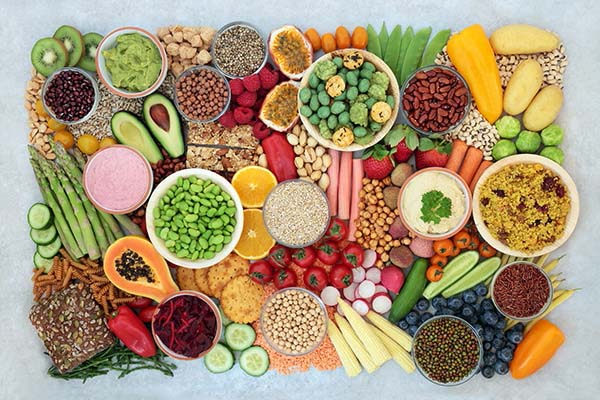Everything About Healthy Food: Benefits of Embracing Plant Based Options
The discussion surrounding plant-based diets has gotten substantial focus in recent times. Lots of people are discovering the possible health and wellness benefits, nutritional advantages, and environmental impacts related to these nutritional choices. As people come to be extra knowledgeable about their food's impact on health and sustainability, concerns occur about the functionalities of taking on such a lifestyle. What specific adjustments can one anticipate, and just how might these options improve not just personal health but additionally the world's future?
Understanding Plant-Based Diets
Although many individuals link plant-based diets primarily with vegetarianism or veganism, these diet regimens can include a vast array of eating patterns that focus on whole, minimally refined plant foods. Such diet plans often consist of fruits, veggies, entire grains, vegetables, nuts, and seeds, while eliminating or limiting pet items. This versatility permits people to tailor their dietary selections according to dietary needs and personal preferences. Some may take on a mainly plant-based diet plan while still sometimes consuming meat or milk, typically described as a flexitarian approach. The emphasis remains on incorporating more plant foods, which can cause a varied range of meals and tastes. Recognizing these various interpretations of plant-based eating is important for valuing its accessibility and appeal in contemporary food society.
Health Advantages of Plant-Based Foods
The health and wellness benefits of plant-based foods are substantial, offering a nutrient density advantage that supports overall health. Research study suggests that these foods can enhance heart health and wellness and play a crucial role in efficient weight administration. By integrating extra plant-based options, individuals may enhance their dietary choices and advertise lasting wellness.
Nutrient Thickness Advantage
Nutrient density plays a vital function in the health benefits of plant-based foods, making them an engaging selection for those looking for a balanced diet. Plant-based foods, such as fruits, vegetables, beans, nuts, and entire grains, are commonly rich in vital vitamins, minerals, and antioxidants while being reduced in calories. This high nutrient thickness enables individuals to eat less calories while still satisfying their nutritional needs. In addition, these foods are loaded with dietary fiber, advertising digestive system health and wellness and aiding in weight management. By including nutrient-dense plant-based choices, consumers can boost their general health, sustain their immune systems, and reduce the danger of chronic diseases. Inevitably, the nutrient density of plant-based foods emphasizes their value in a health-conscious lifestyle.
Heart Wellness Enhancement

Weight Monitoring Support
In addition to advertising heart health and wellness, a plant-based diet can substantially help in weight management. This nutritional approach highlights whole foods such as fruits, veggies, legumes, nuts, and entire grains, which are generally reduced in calories and higher in fiber contrasted to animal-based items. The high fiber material aids enhance satiation, decreasing total calorie intake. In addition, plant-based diets are usually rich in crucial nutrients while low in harmful fats, making it simpler to keep a healthy weight. Gluten Free BBQ Sauce. Study shows that individuals that embrace a plant-based way of living often tend to have reduced body mass indexes (BMIs) and experience even more successful weight loss compared to those who eat meat-heavy diet regimens. Welcoming plant-based alternatives is a strategic choice for efficient weight administration.
Nutritional Worth of Plant-Based Active Ingredients
Plant-based active ingredients are abundant in essential nutrients, providing a diverse range of vitamins, minerals, and antioxidants that contribute to general health and wellness. A comparison of protein sources exposes that while animal products are typically deemed remarkable, many plant-based options offer sufficient protein and other beneficial compounds. Recognizing the dietary value of these ingredients can help people make notified dietary options.
Vital Nutrients in Plants
Nutrient-rich components found in plants offer a varied variety of necessary minerals and vitamins that contribute greatly to total wellness. These components are rich in vitamins A, C, and K, which sustain immune feature, vision, and blood clotting, respectively. In enhancement, plants supply essential minerals such as potassium, magnesium, and calcium, crucial for heart wellness, muscle mass function, and bone toughness. The presence of fiber in plant-based foods aids digestion and promotes a healthy and balanced gut microbiome. Antioxidants, found abundantly in vegetables and fruits, assistance combat oxidative stress and anxiety and decrease swelling. Lots of plant foods are reduced in calories yet high in nutrients, making them an outstanding selection for those seeking to keep a healthy weight while making sure ideal nutrient intake.

Comparing Protein Resources
Healthy protein sources vary considerably in their dietary accounts, with plant-based components providing unique benefits. Unlike animal proteins, which frequently contain hydrogenated fats and cholesterol, plant healthy proteins tend to be reduced in these harmful elements. Legumes, nuts, seeds, and whole grains are abundant in necessary amino acids, fiber, vitamins, and minerals. For example, lentils provide high protein content along with considerable iron and folate, while quinoa is a complete healthy protein, using all nine crucial amino acids. Furthermore, plant-based healthy proteins are often come with by anti-oxidants and phytochemicals that sustain overall health and wellness. The shift to plant-based healthy protein sources not only boosts nutritional consumption but additionally aligns with lasting dietary methods, reducing ecological influence and promoting lasting health advantages.
Ecological Impact of Plant-Based Consuming
As awareness of climate adjustment expands, numerous people are exploring sustainable nutritional selections that can considerably lessen their environmental impact. Plant-based consuming has become a substantial contributor to decreasing greenhouse gas exhausts, which are primarily related to image source animals manufacturing. The farming of fruits, veggies, beans, and grains generally needs less sources, such as water and land, contrasted to pet farming. Additionally, plant-based diets can result in reduced logging, as much less land is required for grazing animals or expanding pet feed. By changing in the direction of plant-based alternatives, customers can sustain biodiversity and advertise much healthier ecosystems. In general, embracing plant-based eating not only advantages individual health yet also stands for a crucial action towards environmental sustainability and conservation efforts.
Overcoming Common Misconceptions
While several individuals recognize the advantages of a plant-based diet, several misunderstandings commonly hinder them from totally accepting this way of life. A typical belief is that plant-based diets do not have enough healthy protein; nevertheless, various plant sources, such as beans, nuts, and tofu, give adequate protein. Additionally, some assume that this diet regimen is costly, when as a matter of fact, staples like beans, rice, and seasonal vegetables can be fairly budget friendly. An additional mistaken belief is that plant-based eating is overly limiting, whereas it really offers a varied variety of flavors and foods. Numerous worry that a plant-based diet plan may lead to deficiencies, yet with appropriate preparation, people can acquire all required nutrients, consisting of vitamins and minerals, while taking pleasure in a large variety of scrumptious meals. Vast Tips for Transitioning to a Plant-Based Way of living
Making the change to a plant-based way of life can be an enhancing experience, though it frequently requires some support to navigate the first changes. People are motivated to begin gradually, incorporating even more fruits, veggies, beans, and whole grains into their dishes while minimizing meat and dairy products usage. Meal preparation is important; preparing a regular food selection can assist alleviate the change and protect against final unhealthy learn this here now choices. Exploring cooking approaches and brand-new recipes can also maintain and boost the experience enjoyment concerning plant-based consuming. In addition, joining support teams or communities can offer motivation and share useful suggestions. Ultimately, staying educated about nourishment assurances well balanced meals, protecting against shortages while cultivating a healthy and balanced, rewarding plant-based lifestyle.
Delicious Plant-Based Dish Concepts
Exploring tasty plant-based dish ideas can motivate individuals to welcome a much more nutritious diet regimen. One preferred alternative is a passionate quinoa salad, featuring cherry tomatoes, cucumber, and a tangy lemon-tahini dressing. Another favorite is a tasty lentil stew, loaded with carrots, celery, and aromatic herbs, YOURURL.com ideal for a soothing supper. For breakfast, overnight oats made with almond milk, chia seeds, and topped with fresh berries give a nourishing begin to the day. Furthermore, a lively vegetable stir-fry with tofu and a selection of vibrant veggies can be a fast yet pleasing dish. Creamy avocado toast on whole-grain bread, sprayed with flavors and seeds, offers a straightforward yet flavorful treat. These dishes showcase the selection and richness of plant-based consuming.

Often Asked Inquiries
Can a Plant-Based Diet Plan Offer Enough Healthy Protein?
The concern of whether a plant-based diet can supply sufficient healthy protein is typical. Various resources, including beans, nuts, seeds, and whole grains, can fulfill protein requires successfully, supporting a nourishing and balanced diet plan for individuals.
Are Plant-Based Diet Plans Suitable for Children?
The viability of plant-based diet plans for youngsters depends on mindful planning. Appropriate nutrients need to be ensured, including proteins, minerals, and vitamins. With correct support, such diet regimens can support healthy and balanced development and development in youngsters.
How Do I Eat in restaurants on a Plant-Based Diet regimen?
Dining out on a plant-based diet plan entails seeking restaurants with varied food selections, asking for adjustments, and discovering vegan-friendly options. Planning in advance and connecting nutritional preferences can improve the eating experience while keeping nutritional choices.
What Prevail Irritants in Plant-Based Foods?
Usual irritants in plant-based foods consist of soy, gluten, nuts, and seeds - Gluten Free BBQ Sauce. People following a plant-based diet ought to be conscious of these irritants and review tags very carefully to stay clear of damaging responses and assure safe consumption
Can Plant-Based Diets Assist With Weight Management?
Study shows that taking on a plant-based diet regimen might promote weight loss due to its generally lower calorie density and higher fiber content. This combination can boost satiation, aiding people handle their caloric intake efficiently. Numerous people associate plant-based diet regimens mostly with vegetarianism or veganism, these diet regimens can incorporate a large variety of eating patterns that prioritize entire, minimally refined plant foods. Nutrient density plays a vital role in the health advantages of plant-based foods, making them an engaging option for those seeking a well balanced diet regimen. Plant-based diet regimens have actually been revealed to substantially boost heart health and wellness, as they commonly include elements that sustain cardiovascular function. In enhancement to promoting heart health, a plant-based diet regimen can significantly aid in weight monitoring. A typical belief is that plant-based diet regimens lack sufficient healthy protein; nevertheless, numerous plant resources, such as legumes, nuts, and tofu, give adequate protein.